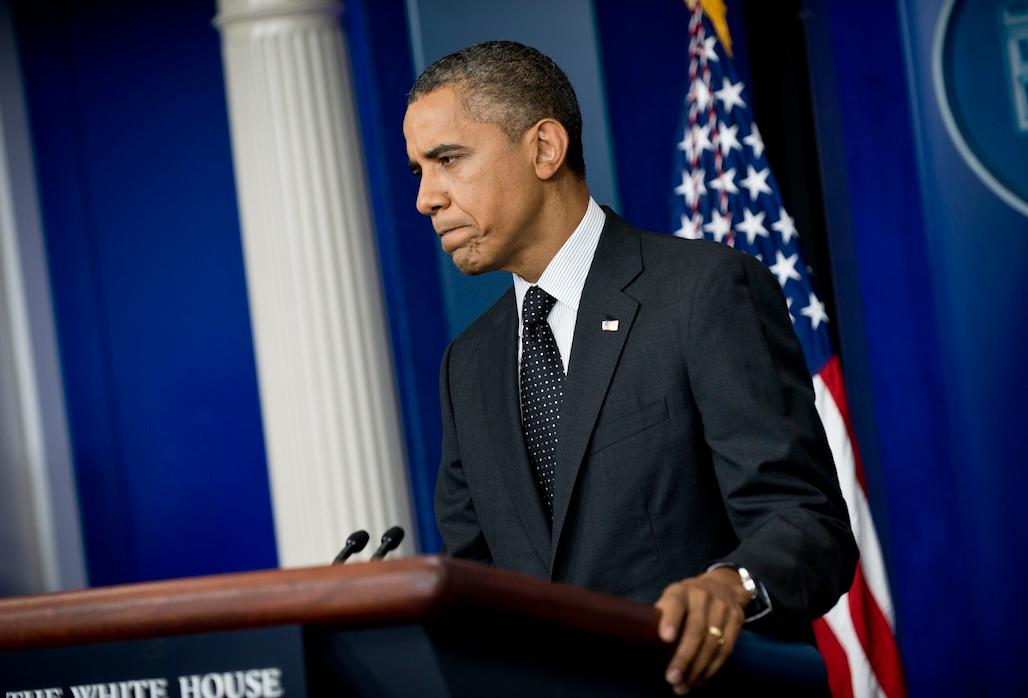Parsing Obama’s comments on chemical weapons and Syria (Q&A)
US President Barack Obama pauses during a press conference in the briefing room of the White House August 20, 2012 in Washington, DC.
As UN observers made their way out of Syria on Monday, the start of Eid marked an especially bloody day in the country, with reports putting the number of dead at well over 100. That same afternoon, President Barack Obama stated a "red line" for possible US military involvement in the conflict: movement or use of chemical weapons.
"We have been very clear to the Assad regime, but also to other players on the ground, that a red line for us is we start seeing a whole bunch of chemical weapons moving around or being utilized," Obama told reporters during a press conference, according to a transcript of his remarks. "That would change my calculus. That would change my equation."
The president also noted that the issue of chemical and biological weapons "doesn’t just concern Syria; it concerns our close allies in the region, including Israel. It concerns us. We cannot have a situation where chemical or biological weapons are falling into the hands of the wrong people."
The comments provoked a response from Russia, whose foreign minister on Tuesday condemned the idea of unilateral action in Syria, saying only the UN Security Council could authorize the use of force, according to the BBC. A Syrian minister also responded, arguing the comments show Obama is looking for a pretext to interfere in the conflict, the Associated Press reported.
UPDATE: On Wednesday, Chinese state media accused "Obama of planning to use Syria's chemical weapons as an excuse for intervening militarily." A commentary, published in Xinhua, stated that "Once again, Western powers are digging deep for excuses to intervene militarily," and compared Obama's warning with "hypocritical talks (sic.) of eliminating weapons of mass destruction in Iraq."
In a conversation with GlobalPost, Columbia University foreign policy and counterterrorism expert Stuart Gottlieb shared his thoughts on Obama's remarks, highlighting considerations about Israel and regional security. The following is an edited version of the exchange.
President Obama said the US would consider military involvement in the Syrian conflict if it saw evidence of chemical weapons being moved or used. What does that stance reflect?
I think partly it’s the United States’ concern over [the possibility that chemical weapons could] fall into the wrong hands, like al Qaeda affiliates, on the ground there. Also, Israel is keeping the closest eye in the region on where these chemical weapons are going because Israel has a much closer existential threat from these chemical weapons being used against them. So you could have either the US or Israel, or both [taking] military action.
For obvious reasons the US doesn’t want Israel to do this, because that would just inflame the region and play right into the hands of Assad and some of the other radicals, potentially.
Why are we hearing this from the United States now?
The situation is deteriorating, and the possibility of chemical weapons caches falling into the wrong hands is rising. And the danger, or threat, of those being used and what it would mean is growing.
The possibility of Israeli preemptive-type strikes is growing also. I think the US sees an increasing possibility of Israel taking proactive action and is trying to calm Israel’s concerns, and [is] also putting a threatening message down to the folks who might consider using the weapons — or getting their hands on them or pawning them off — to make them think twice.
Can you explain why the use of chemical weapons in Syria would be such a game-changer?
Chemical weapons would make what’s currently a nasty conventional civil war into something even more nasty. It would potentially kill a lot more people and become much more of a grave humanitarian crisis. But it could also have regional effects…. If [weapons are] launched against Israel or another neighboring country, it could provoke a more regional conflict.
Is the bigger concern the potential of the weapons getting into the wrong hands, rather than the damage they might inflict inside Syria?
Well, it’s both. They’re dangerous weapons in an unstable environment.
